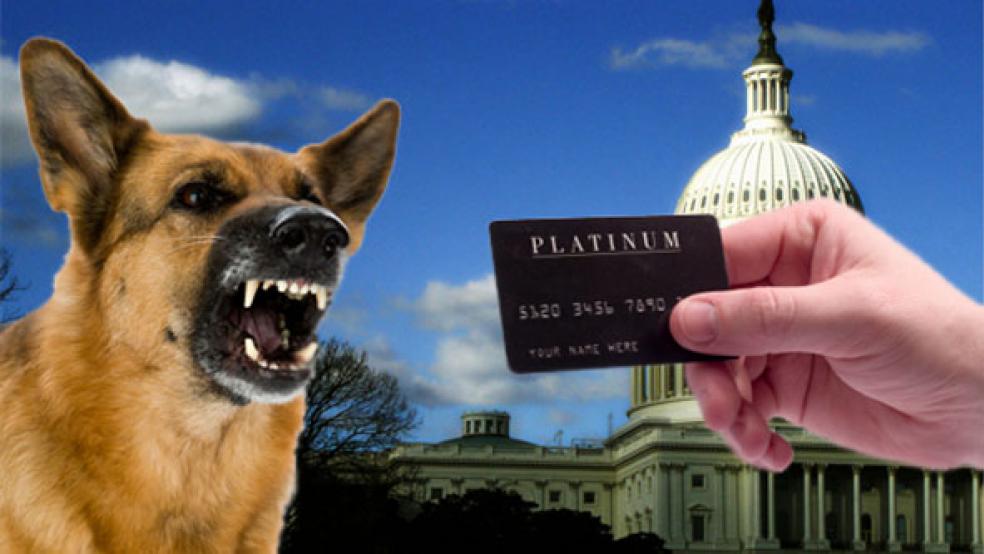When it comes to overhauling financial regulations, Democrats and Republicans have much to fight over: how best to rein in the derivatives market, establish bank takeover procedures, curb executive pay and end government bailouts of mismanaged institutions deemed "too big to fail."
But as the Senate prepares to debate a bill next month aimed at preventing the behavior that led to one of the worst financial crises in U.S. history, perhaps the most contentious measure is one that would create a regulator devoted to protecting consumers from unscrupulous or reckless practices.
President Obama and House and Senate Democratic leaders believe the proposal is a no-brainer. Unless an independent regulator is looking out for consumers, they say, any financial regulatory reform will fail to prevent the kind of risky behavior and predatory business practices that fostered the 2008 financial meltdown.
"Our legislation will protect consumers from unsafe financial products, such as the subprime mortgages that led to the financial crisis in the first place," said Senate Banking Committee Chairman Christopher Dodd, D-Conn., just before his committee approved the measure on Monday. "Most importantly, it will restore financial security so that our economy can create jobs and offer middle-class families a chance to build wealth in our country."
Banking lobbyists and conservative lawmakers say a new layer of regulation would be costly and inefficient, and could even put the financial system in danger by forcing financial institutions to offer products at unreasonably favorable terms to consumers.
"The bureau could issue a rule that would undermine the safety and soundness of the bank," said Scott Talbott, a senior vice president at the Financial Services Roundtable, which represents the world's biggest financial institutions. "The issue is not whether we should protect consumers or not; everybody agrees on that shared goal. The question is, what is the most effective way to do it?"
Debate is certain to be extensive and hard fought, with lawmakers divided sharply along ideological lines, and unlikely to be resolved easily -- if at all. Business interests are pushing to weaken the regulator's power or kill it, while consumer advocates want to beef up the initial proposal.
A coalition of consumer and labor groups are backing the legislation. "The Democrats will have a hard time explaining to consumer groups if they can't get it passed. The Republicans have made it clear that this is something they see as unnecessary legislation. It's going to be a close vote," said David Min, associate director for financial markets policy at the Center for American Progress, a progressive think tank.
The U.S. Chamber of Commerce has launched a $3 million advertising campaign against regulatory overhaul, with the proposed consumer watchdog a central target. A senior Treasury official this week blasted the chamber’s tactics.
"The Chamber of Commerce -- funded, no doubt, with a good deal of your money -- has launched a lavish, aggressive and misleading campaign to defeat the proposed independent agency," said Deputy Treasury Secretary Neil S. Wolin at a Chamber summit, noting that the Republican administration of President George W. Bush also proposed creating a dedicated consumer and investor protection regulator.
The financial crisis rocked public confidence in the world's major financial institutions and the government agencies charged with regulating them. The populist backlash has been particularly hard on once-revered regulators, including the Federal Reserve Board and the Treasury, which have faced criticism that they favored Wall Street over Main Street.
Knowing that the public wants new financial rules aimed at preventing a future crisis, lawmakers expect Congress to act on the issue shortly. Dodd predicts action on the Senate floor within a month.
The House has already passed a regulatory overhaul that would create a stand-alone Consumer Financial Protection Agency as well as regulate derivatives and executive compensation, and establish both a council of regulators to identify firms that might put the system at risk and a process for dismantling such institutions.
By contrast, the Senate legislation would create a consumer protection bureau within the Federal Reserve, with the same charge to protect individuals from deceptive practices, abusive terms and hidden fees for financial products such as mortgages and credit cards.
Currently, the responsibility for consumer protection is divided among seven bank regulators primarily focused on ensuring the safety and soundness of the institutions they regulate. The thinking is that an independent regulator solely looking out for consumers' interests would have spotted and stopped the mortgage abuses and risky subprime loans that created the financial crisis.
Key issues up for debate revolve around how independent the regulator would truly be, including:
• Whether it would be a stand-alone agency or a bureau of the Fed,
• Whether and how it could override other regulators in disputes, including the states,
• Which institutions and financial products it would regulate,
• How it would be funded and who would set the budget,
• Its power to examine bank records and operations in order to enforce its rules.
The Senate proposal would give the bureau power only over institutions with $10 billion in assets or more, excluding nearly half of bank branches, said John E. Taylor, president of the National Community Reinvestment Coalition, which represents 600 community organizations.
"It is better than nothing but it's not as good as what this Congress is empowered to do," Taylor said. "75 percent of the American public believes there needs to be a response to this kind of malfeasant lending."





